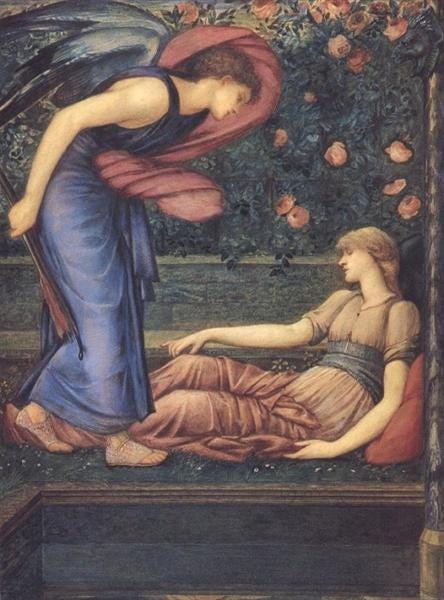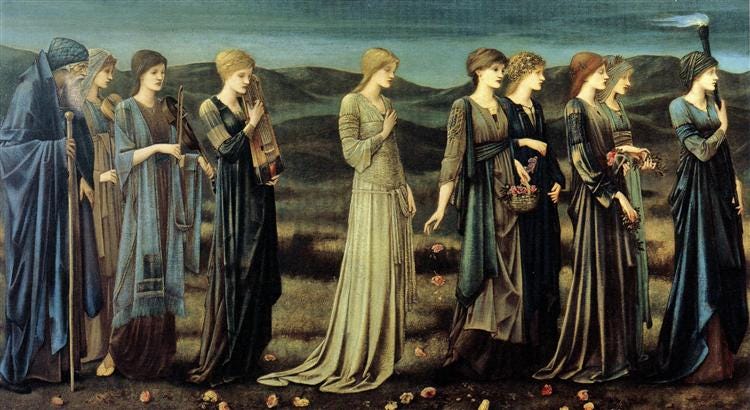Till We Have Faces by C.S. Lewis
One of Lewis’s favourite books, it had been on his mind to author a retelling for years. A nuanced, layered and complex story.

Till We Have Faces was a book I’d avoided for a while, mostly because I had the idea that it would be a stiff and ponderous read, but what a strangely captivating story it turned out to be!
Subtitled, A Myth Retold, C.S. Lewis took the story of Cupid and Psyche originally written about 125 AD by Lucius Apuleius Platonicus (which you can read here) and retold, or re-interpreted it, from the point of view of Psyche’s older sister, Orual.
Lewis said of his book that it was,
‘...the straight tale of barbarism, the mind of an ugly woman, dark idolatry and pale enlightenment at war with each other...'
Orual is the ugly eldest daughter of Trom, the widowed King of Glome, an ancient barbaric kingdom, and Psyche is her beautiful younger half-sister. Orual is an unreliable narrator and presents everything in the light of her skewed perspective; her outer ugliness a reflection of what’s going inside her. She expresses a love for Psyche that she considers to be akin to maternal love, but in truth it is manipulative and devouring.

When Psyche submits to leaving her home to be the ransom for all Glome, Orual vents her anger and hatred upon the gods. Becoming more bitter and twisted as she grows old, she covers up her outer ugliness with a veil.
For most of the book, Orual presents a compelling case, but we begin to see her unreliable nature as a narrator or interpreter of events as the book comes to an end. She had written her complaint in a book she authored but at the end of her life as she stands before the judge with her book in her hand, her veil is removed, and she stands naked before countless gazers. She is then told to read her complaint aloud.
'I looked at the roll in my hand and saw at once that it was not the book I had written, it couldn’t be; it was far too small. And too old - a little, shabby, crumpled thing, nothing like my great book that I had worked on all day, day after day...
A great terror and loathing came over me. I said to myself, “Whatever they do to me, I will never read out this stuff. Give me back my Book.” But already I heard myself reading it.'
As Orual read aloud, her voice was strange to her, but she knew that now she was hearing her real voice.
'I saw well why the gods do not speak to us openly, nor let us answer. Till that word be dug out of us, why should they hear the babble that we think we mean? How can they meet us face to face till we have faces?'
Orual was being ‘unmade.' She admitted that she had never had one selfless thought of her sister, Psyche. She confessed that she was a craver.
Orual ends her narrative with these beautiful words before she died:
'I ended my first book with the words No answer. I know now, Lord, why you utter no answer. You are yourself the answer. Before your face questions die away...'
The myth of Cupid and Psyche takes on a new meaning with Lewis’s interpretation. How easy it is to be unreliable narrators and only view our lives as we ourselves see it outworking. This struck me so forcibly when I first read this book in 2019. As I looked back on some of the circumstances of my own life, I could see where my skewed perspective re-interpreted situations in line with my own thinking and not as they really were.
Till We Have Faces has a strangely beautiful twist that in my mind echoed a little of the Book of Job in the Old Testament. It is a wonderfully layered, deep book that reverberates in your soul long afterwards. And contrary to my original misgivings, it was surprisingly easy to read.
Carol’s Substack is free to read but if you would like to support my writing you may make a donation here:




It took me a while to get around to this book as well, but quickly became a favorite of mine. I had my thoughts on it here: https://open.substack.com/pub/codyilardo/p/seeing-the-gods-face-to-face?r=1q8ur0&utm_campaign=post&utm_medium=web